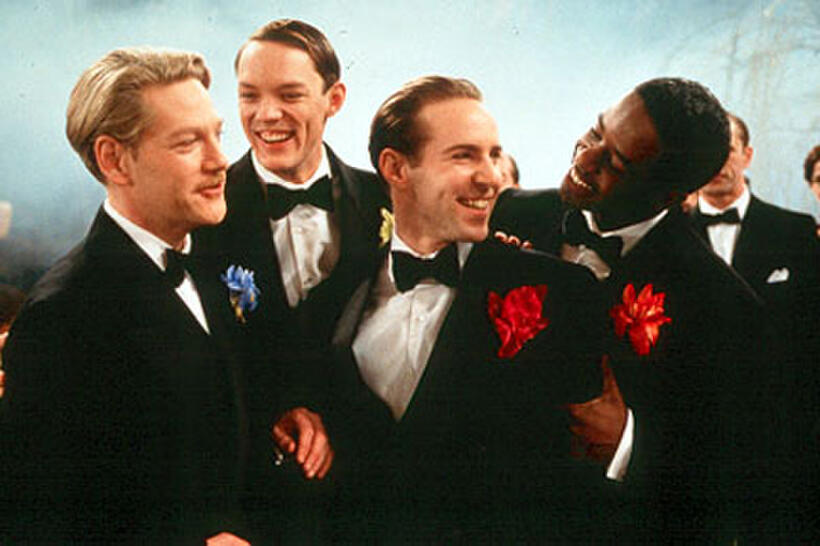On paper, Kenneth Branagh’s Love’s Labour’s Lost sounds inspired: take one of Shakespeare’s least-known plays, adapt it for the screen for the first time and transform it into a frothy musical to make it more accessible. Would that it t’were so simple.
The King of Navarre (Alessandro Nivola) decides that he and three of his closest friends and courtiers should retire from the world into the seclusion of three years’ study. They will sleep little, eat less and abstain from any contact with the fairer sex, the better to concentrate on self-improvement. While Lords Dumaine (Adrian Lester) and Longaville (Matthew Lillard) are giddy at the prospect, Lord Berowne (Kenneth Branagh) questions the wisdom of the endeavour. Surely they’re swearing an oath that will be impossible to keep. And what does His Majesty intend to do when the Princess of France (Alicia Silverstone) arrives shortly on a state visit?
Trapped between the demands of protocol and his oath, the King receives the Princess and her party—including the Ladies Rosaline, Maria and Katharine (Natasha McElhone, Carmen Ejogo and Emily Mortimer respectively) and the Princess’ servant, Boyet (Richard Clifford)—but asks them to camp outside his court. His precautions are all for naught. Since birds, bees and even educated fleas do it, it’s no surprise that the King falls in love with the Princess and each of his lords with each of her ladies.
After three successful Shakespeare adaptations—Henry V (1989), Much Ado About Nothing (1993) and Hamlet (1996)—and one Bard-adjacent original—the underseen In the Bleak Midwinter (1995)—bringing Love’s Labour’s Lost to the big screen must have seemed a tempting challenge for Branagh. The play is one of Shakespeare’s earliest comedies, full of historical and literary allusions that have become less accessible over the past 400 years and make it harder for modern audiences to find their footing. It’s also remarkably wordy: act five contains both the longest scene and longest single word in all Shakespeare’s plays.
Branagh’s solution is to jettison most of the text and slot what remains into the highly stylized framework of a 1930s Hollywood musical. The film is comfortably studio-bound—the French ladies make their entrance floating down a dreamlike river that could only exist on a soundstage. The songs are drawn from the Great American Songbook and the costumes, colour-coded for our convenience, feel like the sorts of ensembles Fred Astaire or Ginger Rogers might have reached for while unpacking a steamer trunk. (In their first scene, the King and his lords wear ties round their waists as belts; Astaire famously did the same.)
The plot is negligible. This works in Top Hat (1935) or Swing Time (1936), where the script is intended to play second fiddle to the musical numbers. But it nearly proves Love’s Labour’s Lost’s undoing. Take the film’s staging of Irving Berlin’s ‘No Strings (I’m Fancy Free)’. The Princess and her ladies sing and dance their way through their morning routine, complete with a bracing swim in a pool which Branagh clearly intends as a tribute to Busby Berkeley. But instead of Berkeley’s elaborate, controlled kaleidoscopes, we are confronted with shots of flailing limbs and four leads wearing such rictus grins, I worried a firing squad was lurking just off screen.
The problem is Branagh sets the bar too high. His Love’s Labour’s Lost demands a cast who can not only speak the verse trippingly, but also sing and dance and do so in the style of Golden Age musicals. Not even Branagh himself meets this standard. He speaks his lines more naturally than anyone else, and Berowne is the lover with the most distinct personality as a result, but otherwise his abilities fall short of the film’s ambitions.
Only Adrian Lester as Dumaine comes close to getting the balance right. Halfway through the film, the men drift into a library to celebrate their loves. Lester enters last, sings the lion’s share of the Gershwins’ ‘I’ve Got a Crush on You’ and dances with such élan, cartwheeling off a table and doing split after split, that I wanted to stand up and cheer. It’s an all too brief glimpse of what Branagh’s adaptation should have been.
The film’s biggest departure from the play is its ending. After a scene set to the Gershwins’ ‘They Can’t Take that Away from Me’ and a striking interpretation of the play’s last lines (“You that way; we this way.”), Branagh adds an epilogue, which follows the characters through a conflict analogous to the Second World War. It’s a poignant sequence which gives each of the lovers’ relationships an unexpected weight.
Love’s Labour’s Lost is an imperfect adaptation with its heart in the right place. Its affection for Golden Age musicals is obvious and Branagh’s efforts to combine their style with the play might have worked better if he’d been able to fashion more of a plot—or if the imitation of period musicals was more convincing. The film is charming, but slight; it ought to have been so much more.


Leave a Reply